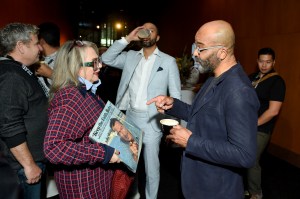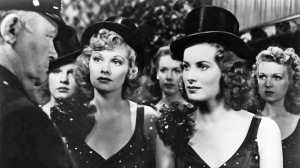EXCLUSIVE: Laura Karpman was drip-fed jazz notes when she was a baby. Her mother’s turn-table featured a playlist that included Miles Davis, Ella Fitzgerald, Wes Montgomery and Thelonious Monk, the virtuoso pianist, whose music informs and underpins her own jazz-infused score for Cord Jefferson’s scorching American Fiction.
“So I remember in her painting studio, my mother had a record player and she would play everything,” Karpman recalls, and for good measure her mother would spin Beethoven’s violin concerto and a piece by Stravinsky.
Karpman lapped it all up, just as her mother had planned, because Mrs.Karpman had preordained “that I would be a composer when she was pregnant,” she tells me.
Her mother was a painter and sculptor “and she always, I think probably inappropriately, thought that music was the highest art. And so she wanted me to be an artist and she wanted me to be a musician.
She had this super eclectic taste in music,” she adds, fully acknowledging “that this had a huge influence on me because that’s what I would hear over and over again. There was no hierarchy. It was just all, ‘Oh, let’s go from Wes Montgomery to Beethoven.’ I loved that about her.”
My entry point to Karpman was catching a YouTube video of a commencement address she made last year to graduates at her alma mater, the University of Michigan School of Music, Theatre & Dance, where, eyes beaming, she spoke of hearing Ella Fitzgerald perform at the school’s Hill Auditorium in 1979.
“I went backstage and I met her and she was just absolutely a spectacular, spectacular woman,” says Karpman, her face full of smiles when we met in Soho, London recently.
“This is somebody who hugely influenced me,” she adds. “When I was a kid, I just listened to her music and I started memorizing all of her scat solos and I really learned how to scat sing just by listening to her and repeating and repeating and repeating.”
Everybody made the trek to Ann Arbor to perform at Hill Auditorium, Karpman recalls. ”Oscar Peterson, Duke Ellington, they all came,” she says.
Thelonious Monk’s vibe
But Thelonious Monk is at the forefront of American Fiction, and the jazz great’s vibe permeates the film.
AMERICAN FICTION, from left: Erika Alexander, Jeffrey Wright, 2023. ph: Claire Folger / © MGM / Courtesy Everett Collection
MGM
For starters, the motif that fuses both Jefferson’s Orion Pictures & Amazon MGM Studios movie, and its source material Percival Everett’s novel Erasure together, is the name of the story’s main protagonist, one Thelonious ‘Monk’ Ellison, played by Jeffrey Wright in the movie.
For her score, Karpman, says that “ you can’t not have [Monk] not be a starting point, It has to be the starting point.”
She and Jefferson talked about using compositions by Monk “but the truth is, this film is actually a really interesting piece to look at for scoring, because it has to have the feeling of jazz. And in fact, they had a temporary score on it with classic jazz, and it felt good, but it didn’t fit the picture. And the thing about this film is you need a score because everything changes so quickly,” she says, noting how a comedy scene transitions into a tragic one, then into another that’s heartfelt and upbeat.
“So you’ve just got to be able to be musically gymnastic. So it needs the flexibility of a score, but it’s got to have the vibe of jazz …and definitely Monk and his piano style.”
Karpman reflects that Everett, while penning his novel, “of course knew this, I’m sure.” Monk was a unique pianist and composer who had a piano style that was “both clean and messy simultaneously” a tone that marries with the personality traits of the character – a professor of English literature who creates a pseudonymous novelist alter ego to get a book published, which Wright captures effortlessly, she praises.
“Monk’s playing is perfect for this particular character that Jeffrey plays,” Karpman continues, “because there’s almost, like oftentimes, a real simplicity of the left hand …there’s a way in which they’re kind of block chords in the left hand, but the right hand can get complex. Sometimes it’s almost like [Monk] hits the keyboard. And so it was a perfect choice for this character.”
To emphasize how the way Monk played connects with ‘Monk’ Ellison’s character, Karpman enjoined jazz pianist Patrice Rushen to play piano with her on the score, “so there’s always this multiplicity of hands, multiplicity of pianists and that winds up being something that’s conceptual and important in the film.”
She points out that Wright’s performance is “so nuanced that the music can’t help but say, ‘We’re here, we’re here.’ And he’s this kind of consistent, evolving force, and the music sometimes leads that and sometimes follows it.”
It’s clear she had fun on American Fiction as she praises the “lovely open spaces” in the film, “for music, places where the pages turn and breath and that are covered musically. So I’m grateful for that, especially in a talk-y movie.”
When she was shown an early cut of American Fiction she knew immediately that she wanted to score it “because jazz is such a part of who I am musically. I wanted to do it to be able to craft a jazz score, but I also wanted to do it because it was a really challenging project. It is delicate. You have to be careful with the music, and then there are times when you can really go for it.”
The issue of race ripples through the film and for Karpman it’s a concern that “if you grow up in America, if you don’t think about or deal with the issue of race, then you are not doing the right thing at all.”
“And so as a queer person, but also as a white person, I’ve had to think about this and think about what it means to me, what my role is in all of this,” she says.
“Also, as a musician, a huge part of what American music sounds like comes from Black music. And that means concert music as well, not just jazz,” she says. She observes how Leonard Bernstein, played by Bradley Cooper in Maestro, is “a white Jewish guy that comes out of jazz.”
“I mean, there wouldn’t be that music had there not been jazz,” she says. “And he would be the first to admit that he did not invent it. What he did was bring it into the orchestra. So, I think this is something I’ve thought about a lot over the years, and it’s important to me.”
“What is it to be an artist?”
Another important issue for Karpman that the film tackles is the question of what it is “to be an artist”.
She mentions how she scored the Disney movie The Marvels, “which is the most commercial type of film, in fact the opposite of American Fiction. “Massive budget, this is a little budget. So this idea of how you navigate being a commercial artist and finding the spaces to express one’s truest self…to be satisfied. And that’s what Monk [in the film] is dealing with.”
The other theme that chimes, powerfully, for Karpman, and for Jefferson and his film, is family.
Her brother plays the drums and country and western music. Her father was a cardiologist – in fact she’s wearing, under a tartan ensemble, a crisp, white monogrammed dress shirt that belonged to him.
A close friend of the family’s was hairdresser Sydney Guilaroff, who was MGM’s chief stylist [he created Claudette Colbert’s bangs], and he was also under the medical care of Karpman’s father.
When Guilaroff died, he bequeathed his 1927 Steinway to “my father because that’s the only way he could pay him.”

Laura Karpman and Jeffrey Wright at Deadline Contenders Film: Los Angeles held at the Director’s Guild of America on November 18, 2023 in Los Angeles, California. (Photo by Gilbert Flores/Deadline via Getty Images)
Karpman says she knew that the Steinway had “seen incredible Hollywood parties. I knew that Vladimir Horowitz had played on it. I had played on it ,” so she had it sent over to her piano restorer.
Six months later “I get a call saying, “I think this may be the best Steinway in Los Angeles,” she tells me.
She tested it “because when you get a new instrument, it’s like weird. It’s like I was used to my old piano…well, wait a minute, oh, this has got a different touch.”
Tinkling the keys, Karpman improvized some music. As she was playing, her wife, fellow composer Nora Kroll-Rosenbaum, came in from the other room and said, “Press record now.”
The piece she played around with on the Steinway became what she calls the family theme for American Fiction.
“So my family very much weighs into this,” she says. “It was something that I really felt in my cache of memories. I think the experience of this family is obviously different from mine but in many ways similar. The father was a doctor. They were a family of doctors and artists, and that was kind of my family.”
Karpman’s currently scoring two interactive games,neither of which she can discuss.
However, there’s a bonza project that she’s eager to shout-out about.
‘Dance, Girl, Dance’
She and Kroll-Rosenbaum have optioned pioneering female filmmaker Dorothy Arzner’s 1940 RKO Picture Dance, Girl, Dance, based on an original story by Vicky Baum, starring Maureen O’Hara and Lucille Ball. It’s a backstage drama focussing on a group of women trying to make it in New York as dancers.

Lucille Ball and Maureen O’Hara in Dance, Girl, Dance. Courtesy RKO Pictures/BFI
“My other sort of passion has been advocacy and really helping women and underrepresented composers. But Dorothy Arzner has been fundamentally erased, even though she was a really important filmmaker.”
And Dance, Girl, Dance “was one of her great movies, and it’s like a genre film, but very much from a feminist perspective and so we’re going to make a musical and seep in aspects of Arzner’s life because not only was she the only woman who was allowed to work in Hollywood at that time, but she was also completely out as queer.”
She adds that “everybody knew” about Arzner’s queerness. “She walked around in a tie and a suit and she did her thing.”
Dance, Girl, Dance, she says, is ”kind of Barbie before Barbie,” hailing Greta Gerwig’s blockbuster hit as “awesome, great, second wave feminism.”
Karpman argues, convincingly, that Barbie, Dance, Girl, Dance and American Fiction all have something in common, “which is they’re all using laughter to talk about things that are hard to talk about. And I love that Dorothy Arzner did it. Barbie did it, and Cord does it with American Fiction.”
Together, she and Kroll-Rosenbaum are going to “musicalize” Dance, Girl, Dance and her fantasy is that “it would be both for stage and for the screen.”
Not only does she want to amplify Dance, Girl, Dance “and its perfect title,” but she also wants to “bring Dorothy Arzner into the public consciousness.”
The film often pops up in BFI programIng. Karpman urges me to watch the film again and think about it in terms of how Arzner had the audacity “to get away with that.”
So, until we meet again, and we plan to, Karpman has given me “homework” to mull over. I’ve to listen to more compositions by Bill Evans, Oscar Peterson and, of course, Thelonious Monk.
To that list I’ll add some of Karpman’s own work.
There’s Ask Your Mama, the multimedia piece she wrote in 2008 with the soprano Jessye Norman based on Langston Hughes’s poetic cycle Ask Your Mama: 12 Moods for Jazz.
And then there’s her American Fiction score, which has been playing in my ear, on repeat, as I write.
To me, it’s a 21st century American classic.

